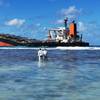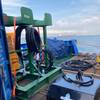Jacksonville – TWIC Enrollment Encouraged
Starting December 1, port workers must have a TWIC to gain unescorted access to facilities in all port facilities. A TWIC is required for any individual requiring unescorted access to secure areas of port facilities, such as vessel crewmembers, longshoremen, truckers, agents, railroad personnel and contractors.
It can take four to six weeks from the time of enrollment to the time that an applicant receives their TWIC, so port workers need to enroll as soon as possible to meet the December 1 enforcement date.
The Coast Guard has been working with port facility operators to gauge the progress of TWIC enrollment leading up to the December 1 deadline. Port leaders estimated that 12,100 workers in the ports of , Fernandina and Port Canaveral would need to be enrolled, but the latest Transportation Security Administration figures show that fewer than 7,100 people have applied. In addition, local analysis shows that only 62 percent of truck drivers and service providers have their cards.
Enforcement of TWIC is being implemented in stages throughout the country to avoid a rush to enroll. The December 1 deadline applies to the ports of , , , , and ports in and
Starting December 1, facility security personnel will verify that everyone entering the facility possesses a TWIC, and may turn away those without valid identification. While the new regulations allow people without TWIC cards to be escorted onto facilities under certain conditions, individuals should not expect security personnel to be available to conduct escorts.
The Coast Guard will be responsible for enforcing TWIC rules, and will be assisted by facility owners, port police, and other federal, state and local partners to achieve the security goals of the program. To ensure that all port facilities are complying with the TWIC requirements, Coast Guard and other law enforcement agencies will conduct routine inspections and random spot checks.
Violations of the TWIC regulations range from on site education and correction to letters of warning to civil penalties up to $25,000 per violation per day. In addition, operations could be secured at a particular facility depending on the situation.
(Source: Coast Guard)










